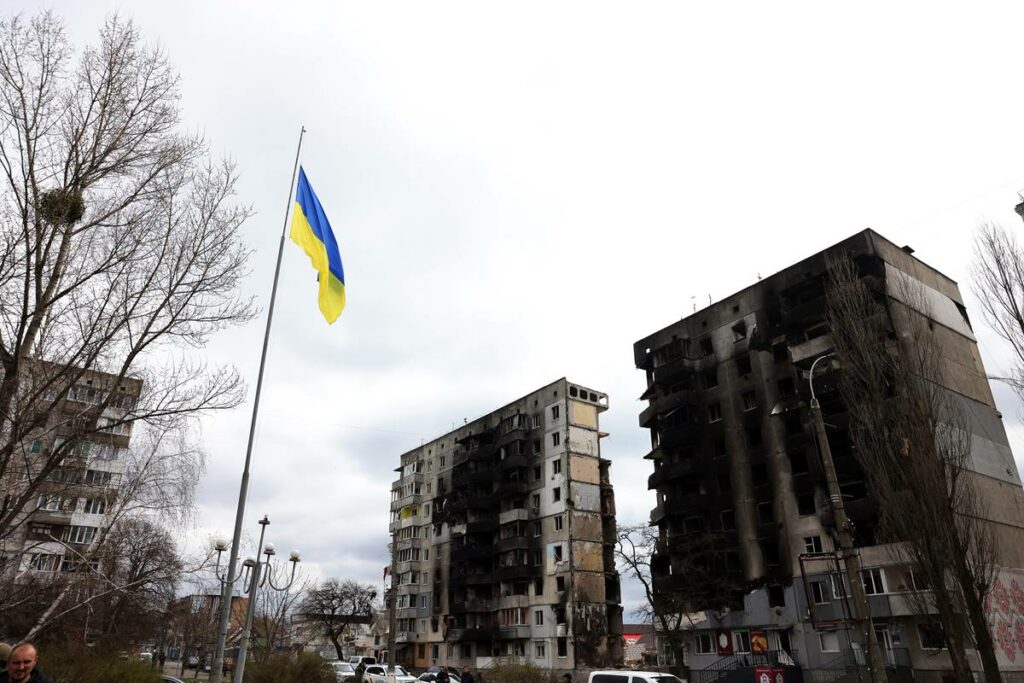Ukraine’s fight against Russia’s invasion seems to be intensifying with explosions rocking a Russian military base in Crimea and President Zelensky confidently stating that the war must end with the liberation of Crimea.
Aid is pouring in from fellow nations to help Ukraine defend itself against some 120 battalions (800 troops each at full strength) inside Ukraine and more stationed on the border. There are reports that Ukraine’s military advance has cut off the supply lines of 20,000 troops around Kherson.
It would be unwise, however, to draw any firm conclusions.
Ukraine was in a similar situation in 2014. In July and August that year, there were fierce battles. Cities changed hands. Ukraine was doing well. Then, round about 24 August, on Ukraine's Independence Day since the dissolution of the Soviet Union in 1991, there was a dramatic shift. Russian commanders inflicted the biggest defeat on Ukraine at the Battle of Ilovaisk.
It proved to be a pivotal moment. Russian troops poured into the Donets region, occupied it, and moved closer to the harbour city Mariupol. The rest is history as the defeat forced Ukraine to the negotiation table in Minsk, Belarus, for endless months of ‘peace talks’ about East Ukraine. They were meaningless - except for the fact that Crimea was the elephant in the room.
Russia did not allow Ukraine any discussion about Crimea. At the talks, the West closed ranks with Russia. The West acquiesced in Russia’s blatant land grab, hoping that its aggression would quickly evaporate like a very unpleasant smell. The parallels here with Sudetenland in 1938-39 are painful and plentiful as the analysis in my book “Blowing up Ukraine: The Return of Russian Terror and the Threat of World War III” shows.
What was it about the 24th August in 2014 that matters today?
It was hardly the fact that it was Ukraine’s Independence Day. As far as the Kremlin is concerned, that day is a joke and no one in Moscow pays any attention to it, except to scoff at it. Since 2007, several members of Putin’s inner circle have made it clear that it is current Russian state policy to consider the borders of the Russian Federation to be those of the Soviet Union of 1922 and extended by Stalin in WWII.
Never mind that the ideological thrust of the Union of Soviet Socialist Republics (USSR) was the ‘union’ of the international proletariat and Putin’s ‘federation’ is based on the polar opposite — Russian nationalism. Both are derived straight from Moscow’s rule book invented by Catherine the Great, Empress of Russia in the 18th century, under whom Russia’s expansion first reached Eastern Ukraine, Crimea and the Black Sea.
There are two things that do matter about the last week of August. The first is that it is the beginning of the election season in Russia.
11 September is Election Day for Russia’s rolling regional elections. These are the type of ‘elections’ that Stalin would recognise. It is not the people who vote that matter, it is the people who count the votes that matter. Since 2000, when Putin became Russia’s president for the first time, he has made sure it is the Kremlin that does the counting.
Even so, like the team of Coriolanus Snow in the Hunger Games, the Kremlin needs to put together a good show so that the optics justify that Putin’s United Russia Party wins everywhere yet again for more than two decades straight. Such as a ringing military victory and a defeated underling: Election Day was on 14 September in 2014 and on cue the Kremlin forced Ukraine to agree to a cease fire on 5 September in Minsk.
In 2020 it was Alexei Navalny who challenged Putin. Navalny, a serious rival nationalist threat (paradoxically celebrated in the West despite his rabid nationalism) was poisoned on 20 August.
7 October, another crucial date in Putin’s calendar
But there is a far more important day looming in the month of September. It is really the one date that makes everyone in the Kremlin shake with fear. That day is 7 October, Vladimir Putin’s birthday. On that day, there is a roll call of the President's magnificent achievements that year.
In previous years, the Kremlin had arguably gone above and beyond. Putin’s birthday, for example, coincided with the killing in cold blood of opposition journalist Anna Politovskaya in 2006 (followed weeks later by a former KGB officer and defector, my co-author and friend Colonel Alexander Litvinenko). This year, 2022, is particularly special as it is Putin’s 70th birthday.
Given the very public invasion of Ukraine on 24 February, almost six months ago, everyone in the Kremlin is aware that the ‘show’ for this September’s Election Day had better be spectacular. An announcement about a major victory in the ‘liberation’ of Ukraine will need to be made by hook or by crook - one that makes the Kremlin and Russia look all-powerful to the electorate.
And this will have to hold throughout the month of September for that all important roll call of the President’s Achievements [достижений dostizhenii] on his seventieth birthday that follows thereafter.
A major military success like the decisive 2014 Battle of Ilovaisk is the obvious answer. Such an attack may well be imminent in the weeks ahead. The Ministry of Defence warned recently that Russia is about to form a major new ground force unit, the 3rd Army Corps of up to 15-20,000 troops.
Ukraine still fighting an uneven war
One could point out that the difference with 2014 is that Ukraine has an army of up to 1 million troops and that many Russian-speaking Ukrainians today hate Russia with a vengeance. While these are previously unthinkable developments, it would be a naïve reading of the war that Russia ignited on 24 February.
Ukraine is still fighting an uneven war. The Russian navy in the Black Sea may be old and tired, but Ukraine has no navy at all so those superannuated Russian battleships can obliterate Ukraine’s coastline without punishment — as they did successfully with their destruction of the harbour city of Mariupol. On its coastline, Ukraine continues to be pummeled without mercy.
Ukraine’s hands are tied behind its back in another way, too. Its army is entirely dependent on foreign military aid, weapons, ammunition etc, which can only be used for very specific purposes. Ukraine cannot use this aid to launch cross-border attacks as Russian troops on Russian territory are out of bounds. It is hard to win a war if all your adversary has to do is to cross the border and move behind an invisible shield (nuclear threat).
This is not only down to Ukraine’s bad luck. Traditionally foreign military aid in a conflict such as Ukraine’s, always favours a certain outcome: enough to stop the aggressor, not enough to force his withdrawal from territory gained. The foreign military aid is there to maintain a status quo, not to lead to victory.
That default option by the West was certainly the case in the Minsk talks in 2014 and the interminable and empty agreements that followed them. To push Russia back to its 1991 borders, Ukraine needs far more military aid than it is receiving to date.
Risk of nuclear retaliation
The big question in 2022 for Ukraine’s president Zelensky is undoubtedly this one: what will our allies do in case of a major assault? Will Ukraine finally get enough aid to defeat Russia and launch an all-out attack to avoid an Ilovaisk II? The same question must also be alive in the allied capitols, but seen from the other side. It is the 2014 problem all over again, but at a far aggravated level.
Can we risk antagonizing Putin by inflicting a ringing defeat on him that will puncture Kremlin’s balloon and narrative? What will he do then?
In 2014, the fear was only about Russian natural gas and pipelines which had been switched on and off by way of threat. Today the fear of retaliation is well beyond the commercial. Yet, it is only sufficient and overwhelming military aid that will finally contain the crisis to Ukraine’s borders. Today’s status quo favours the Kremlin. Putin has waged a war against Ukraine independence since 1999 and is prepared to wait, regroup, and come back stronger to achieve his goal.
NATO countries, and that includes Black Sea neighbour Turkey, still do not realise that each time a dictator gets a pass you magnify your own problems in the future.
If you worry, say, about a mystery explosion of a nuclear reactor at Zaporizhzhia in retaliation for a defeat, think about what you will have to worry about in the foreseeable future when Belarus is fully up and running as the 10th nuclear power in the world. Moscow can then act as if it has nothing to do with Belarus’s nuclear decisions or ‘mistakes’.
I am not convinced that historical lessons have been learned from the recent and more distant past by the many countries who support Ukraine with military aid - but still not enough aid for Ukraine to win. Zelensky’s headache and dilemma must count as our own.
By Dr Yuri Felshtinsky, co-author with Michael Stanchev of Blowing up Ukraine: The Return of Russian Terror and the Threat of World War III (2022, Gibson Square)


